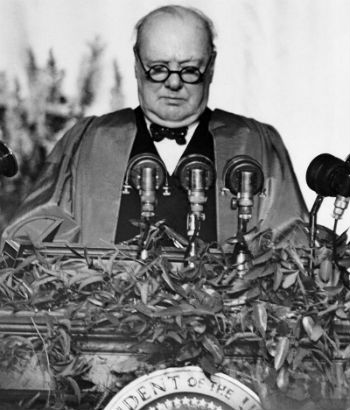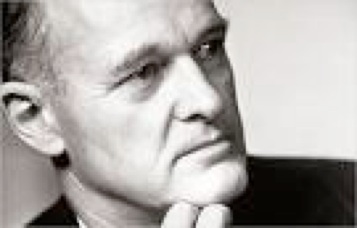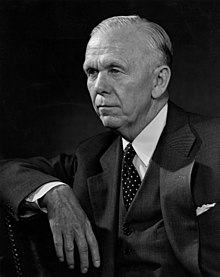Cold War and Containment – 1945-1950 – Words For Now?
 Winston Churchill
Winston Churchill(Ed. Russia so much back in the news with overblown rumblings of a new Cold War. Timely to remember the old Cold War for some perspective perhaps. As usual a two-pronged approach works best. From a talk given at Duarte Library in 2015 on “The World America made.”)
1. March 5, 1946, Winston Churchill Iron Curtain Speech (Fulton, Missouri). The legendary Brit was out of office and invited to speak by President Truman who knew the American public needed awakening:
The United States stands this time at the pinnacle of world power. It is a solemn moment for the American Democracy…I have a strong admiration and regard for the valiant Russian people and for my wartime comrade, Marshall Stalin…We welcome Russia to her rightful place among the leading nations of the world. It is my duty, however, to state the facts as I see them.
From Stettin in the Baltic to Trieste in the Adriatic, an iron curtain has descended across the continent. Behind that line lie all the capitals of the ancient states of Central and Eastern Europe…Turkey and Greece are both profoundly alarmed and disturbed at the claims which are made upon them…From what I have seen of our Russian friends and Allies during the war, I am convinced that there is nothing they admire so much as strength, and there is nothing for which they have less respect than for weakness, especially military weakness.
 George Kennan
George Kennan2. George Kennan, former State Department advisor in Moscow, wrote an article in Foreign Affairs (1947) titled “The Sources of Soviet Conduct” where he argued for an even-handed but vigilant approach called “Containment.”
…The best diplomacy for the United States [is] “a policy of firm containment, designed to confront the Russians with unalterable counter-force at every point where they show signs of encroaching upon the interests of a peaceful and stable world…a policy less than war itself, but a policy of opposing force with force, of drawing a line…a long term patient but firm and vigilant containment of Russian expansive tendencies…such a policy has nothing to do with threats or blustering or superfluous gestures of outward toughness…Russian policy should be put forth in such a manner as to ease the way open for a compliance not too detrimental to Russian prestige.”
3. George Marshall, Secretary of State (1947-1949) – at Harvard 5 June 1947 initiating what became known as the Marshall Plan where the United States pumped c. $16 billion into Western Europe to help rebuild their wartorn economies. Two years later came NATO (North Atlantic Treaty Organization) which was the “stick” after the “carrot.”
 George Marshall
George Marshall“The truth of the matter is that Europe’s requirements for the next three years of foreign food and other essential products are so much greater than her present ability to pay...It is logical that the United States should do whatever it is able to do to assist in the return of normal economic health in the world, without which there can be no political stability and no assured peace…there must be some agreement among the countries of Europe as to the requirements of the situation and the part those countries themselves will take…”
4. Henry Kissinger “Diplomacy” (1994)
“Destiny was surely beyond generous in the talent it bestowed on America in the immediate postwar period. American political leaders were distinguished and experienced men. And behind them stood a reservoir of eminent personalities rotating in and out of government and always available to serve the president on a nonpartisan basis.”
No matter which way we slice it, for those who were there, the times are not as dire now as the immediate postwar period. A speck of good news perhaps in what seems like a recurring media frenzy over Russia.